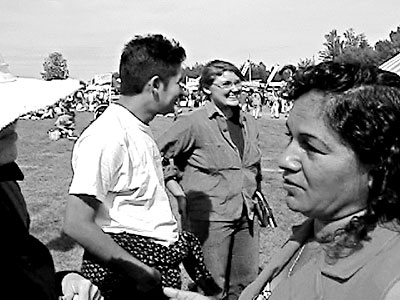 |
| Juvelina Palma spoke with fairgoers after her powerful keynote speech at the Common Ground Fair. English Photo. |
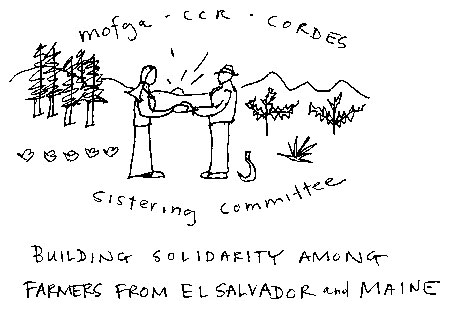 |
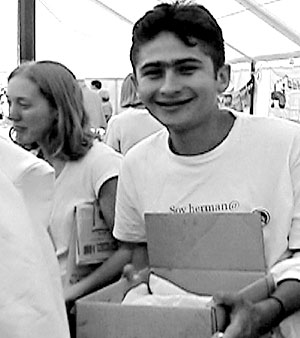 |
| Santiago Serrano (shown here with MOFGA-El Salvador committee member Jess Harper) works with youth in El Salvador, using theater to teach them about “free” trade, health and other issues. English photo. |
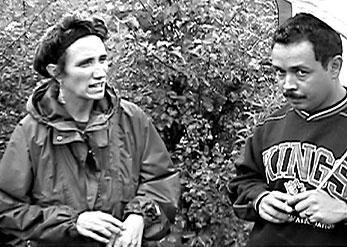 |
| Deb Soule of Avena Institute exchanged information about herbs with Ernesto Morales of El Salvador when the delegates visited Avena’s gardens. English photo. |
 |
| Marisol Ramirez, a Salvadoran delegate who works with artisans (primarily women), enjoyed the view at Avena’s gardens. English photo. |
By Jean English
In September, the MOFGA-El Salvador Sistering Committee, with funds from Maine Initiatives, the Unity Foundation, two Empty Bowl suppers and several private donors, brought four delegates from the Chalatenango department of El Salvador to Maine to visit farms, markets, colleges, a high school and activists in the area and to participate in the Common Ground Country Fair. Chalatenango is home to some 130,000 residents and is about the size of Waldo County. The delegates, who represented two nongovernmental organizations that are sistering with MOFGA, gave two talks in the Agricultural Demonstrations Area of the Fair, and delegate Juvelina Palma gave a keynote speech at the Fair. (A translation is provided in this MOF&G.)
Palma works with women’s programs that provide support and empowerment so that men and women can have the same rights; she coordinates 43 volunteer committees. Marisol Ramirez is involved in commercial development in a cooperative of mostly women artisans who work with wood, seeds, coconuts, natural dyes and fibers. Ernesto Morales, director of the Chalatenango branch of CORDES (see below), coordinates and advises sustainable agriculture programs, finances and institutional development, while Santiago Serrano works with sistering programs and with youth, especially with theater.
The delegates explained that El Salvador is the second most deforested country in Central America, and that only basic tools are available for peasants to work their fields. Their organizations – CCR (Association of Communities for the Development of Chalatenango) and CORDES (Foundation for Communal Cooperation and Development of El Salvador) – help farmers plant long-term perennial crops, such as coconuts, avocados, mangos, papayas and limes, on terraced land, with shorter-term crops in between, such as vegetables, beans and corn. The organizations teach peasants about sustainable methods, partly because chemicals are so expensive in El Salvador. They also provide credit to farmers – at 16% interest for those engaged in chemical agriculture, and 8% for organic growers. The organizations differ from most in El Salvador in that they are composed of campesinos (peasants). In fact, CCR was formed by refugees who wanted to repopulate El Salvador after the civil war and wanted to defend their human rights.
Helping Women
Both CCR and CORDES now help with marketing, organizational development and risk management (against hurricanes, mudslides and earthquakes). They have literacy programs as well. “It has been customary,” said Palma, “that the oldest son is the one who studies, and the daughter stays home with the domestic chores. So there are a lot of young women who do need to learn to read and write.” The organizations have programs that raise awareness about domestic violence against women and infants. “Sometimes there is a lot of violence toward infants at home,” said Ramirez.
The groups are also working to ensure that documents pertaining to ownership of homes and land are in both husbands’ and wives’ names. “There are cases in which only the husband is in the contract, and he makes all the decisions and does what he wants,” said Palma. “It is a very sexist culture,” added Ramirez, “but we believe we’ve made a lot of progress. There is a lot of political participation by women now, in voting, protests, strikes … ” Her crafts program benefits women especially, because it allows them to work in their homes. “Most are single mothers or widows from the war, so they have the possibility of working in the home and taking care of their children.” For eight years, the program has been exporting crafts from the cooperative to Italy and Austria. “Now people aren’t just buying [the crafts] because they feel sorry for us, but because of the quality of our products.”
Forming this artisans’ co-op required persistence. “To form a co-op in El Salvador is difficult,” Marisol said. “A part of the government regulates co-ops. Since the new government four years ago, you have to pay $40 per person to form a co-op, and you need at least 15 people.” They received help from a human rights organization to form their co-op, then had to register to export their goods. Finally they were able to get in touch with fair trade organizations in Austria and Hungary, which sell their products.
Sustainable Agriculture
This sustainable agriculture program is still young. It began in 1995, after El Salvador’s civil war and subsequent peace accords, when the last of the land – in the department of Chalatenango – was parceled out to the people. Previously land had been in the hands of a few rich owners, and the peasants were like sharecroppers – one of the reasons for the civil war. The sustainable agriculture program considers not only agriculture and soil improvement, but also the nutritional well-being of the families involved. “We are working with the whole family [which averages six members], not just the man of the house, to develop a five-year plan for the farm,” Morales said. They began with practical demonstrations on farmers’ land rather than talks, since the illiteracy rate is so high (78%) in the country. They also developed a program in which experienced farmers show new farmers what is possible, and they hold “farmer-to-farmer” meetings, where growers exchange information.
Farmers generally cultivate one to two “manzanas” (7000 square-meter blocks) of poor, steep land, “so the first phase,” said Morales, “is training in soil conservation before planting fruits.” Farmers learn about cover crops, green manures, compost, using chicken manure, alternative methods of pest control, such as plant extracts and soaps to control pests. They are using vermiculture, which works very well in El Salvador’s climate.
The intense dry season is another challenge. Farmers are investigating ways to conserve water with a few reservoir designs.
Seed saving is recognized as important to sustainability. Growers are saving eight varieties of corn seed and a small variety of tomato “for the simple reason that local varieties thrive better in our soils, and fruit production [from open pollinated crops] is more stable than hybrids from year to year. This helps guarantee the survival and health of our people,” Morales noted.
After almost eight years of the sustainable agriculture program, Morales is seeing farms that “are beginning to produce quite a bit and are producing varied diets,” and about 10% of the farms in his area are organic. Some of this food is sold at regional farmers’ markets, which are held on Sundays. “After all the families go to mass on Sunday morning, they go to the market,” said Morales.
Organic food does not demand a higher price in El Salvador, because “in our country, we don’t have that culture,” Morales commented. “We need to educate the people better to eat organic, to drink orange juice and not Coca Cola.” Also, the people of El Salvador would not be able to pay a higher price for organic goods, but organic agriculture “can bring a better product to the people for a lower price,” because agricultural chemicals are so expensive in the country.
The high price of certification has been a roadblock to development of certified organic farms. When the delegates met with the MOFGA staff, executive director Russell Libby suggested that they start with a program of farmers monitoring and certifying one another locally. Libby also recommended bartering as “a good way for small farmers to survive.” Right now, only seeds are bartered among Salvadoran farmers.
When agricultural chemicals are used on non-organic farms, safety considerations are nil. Morales has seen workers applying Paraquat – the number-one herbicide used in the country – by backpack sprayer, with no protection and with the highly toxic compound dripping on their skin. Parathion, another highly toxic pesticide, is used to combat insects, as are Malathion, Sevin and Nudrin (a strychnine compound). Fungicides include copper compounds, Benlate and Manzate.
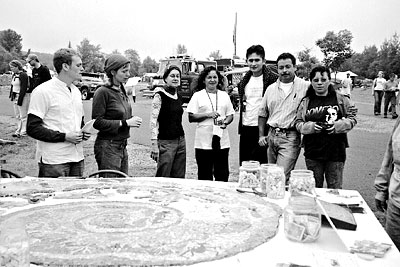 |
| The Beehive Collective presented the Salvadoran delegates with a mosaic-in-progress, which the Bees plan to install in El Salvador this winter. English photo. |
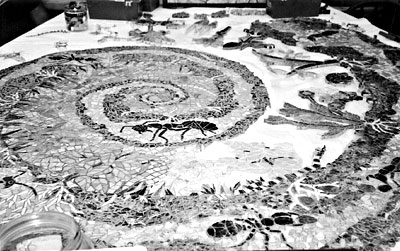 |
| Close-up of the mosaic. English photo. |
Organic growers, on the other hand, depend on extracts of plants such as garlic and onions to fight insects. Neem is used a little, too. Weeds are sometimes controlled with mulches of manure, corn stalks, legumes, hay and/or kitchen scraps. A 15-day compost is made from carbonaceous matter, molasses, black earth and a yeast product.
Plants are sometimes covered with plastic – not to protect them from cold or pests, but from heavy rains.
Morales is working with women to cultivate patio gardens of medicinal herbs. The delegates’ visit to Avena Institute’s garden in Rockport, Maine, was a highlight of their trip, as they exchanged information with herbalists Deb Soule and Julia Yelton about various herbs and their uses – some similar, some differing – in the United States and El Salvador.
Creating a Free Trade Agreement for the Poor
The delegates noted that the idea of “free trade” is for products to pass from country to country without taxes. Unfortunately, this makes the peasants unable to compete with large corporations, since the peasants do not get subsidies that the corporations do, and they have neither sufficient tools nor land to compete. Thus, products entering the country will be cheaper than those produced in the country. Right now, a lot of corn is coming into El Salvador for a low price from Mexico. Palma is afraid that “the only thing that will be available for us after all of these free trade agreements” will be jobs in sweatshops.
Along with “free trade” come efforts to privatize services. Last year the Salvadoran government tried to privatize health care, but the people protested, striking for eight months. Education – already expensive in El Salvador – is another target for privatization. “The government only requires that people have a primary education – just to train people for sweatshops,” said Morales. People work long hours (7 a.m. to 7 p.m.) in these sweatshops, with only very brief lunch and bathroom breaks, and earn only $144 per month, when the basic allowance needed for food, medicines and other necessities in El Salvador is $662 per month, according to the most recent UN data.
Another problem in the country is that “the budget is very low for health and education but very high for the military.”
Plan Puebla Panama will make the situation worse. This is a major highway planned to go from Peubla, Mexico, to Panama – via El Salvador. “El Salvador is so small that El Salvador will be just a highway,” said Morales. Already, 10,000 trees and many homes have been destroyed to make way for the road.
Free trade, sweatshops and other degradations of human life have prompted many Salvadorans to emigrate to the United States. “They don’t come here to sightsee,” said Santiago Serrano, “but because they are hungry, because there are no opportunities in our country. Families are disintegrated when this happens. They have the material goods, but not the love and solidarity. This is why we’re working with young people – because we’d like them to stay.”
Serrano uses theater to help explain the problems associated with free trade, and to teach young people about health issues, women’s rights, and more. Community radio stations do the same.
When asked which government is more of a problem for them, the U.S. or Salvadoran, Ramirez responded: “They’re both the same.” Morales added: “We now have the dollar. Now the stores don’t even take colones, and people who knew the old currency now have to learn a new one. Also, prices were raised with dollarization.”
When asked what U.S. citizens could do to help improve life in El Salvador, the delegates answered: “Don’t buy sweatshop goods; buy directly from artisans.” The delegates noted that when they visited L.L. Bean in Freeport, they “couldn’t believe the super expensive prices” of goods. A baby outfit made in El Salvador, for instance, was selling for 35 dollars.
“So now we’re looking into the possibility in our cooperative,” said Ramirez, “of creating our own free trade agreement among the poor people. We’ll see if we can unite in Central America to make our own clothes. In El Salvador we are trying to make our own T-shirts, but we didn’t have the cotton. But in Nicaragua they do, so we are working with the Nicaraguans.”
Sistering for Solidarity
They also recommended participating in “hermanamientos” – sistering projects – “because then we have an exchange of people to learn about our experiences; we can tell you about our situation. One of our goals is to support each other and share information, so that here you can see the impact of free trade,” said Palma.
The delegates were amazed at the Common Ground Country Fair, which is “completely different from a fair in El Salvador. It’s like a family fair. So many people! So many organic products!” They were very impressed with the cleanliness of the grounds, the organization of the Fair, the number of volunteers involved, the educational value of the exhibits, and the fact that “there were no drunk people.” On the other hand, they were surprised to see so few babies and young children. They would like to try to hold a similar event in El Salvador.
* A trend is developing in Central American countries to refer to our brothers (hermanos) and sisters (hermanas) as herman@s.
Interested in Joining the MOFGA-El Salvador Sistering Committee?
Anyone with an interest in Central America and sustainable agriculture may want to join MOFGA’s El Salvador Sistering Committee. For more information, visit our web pages.
